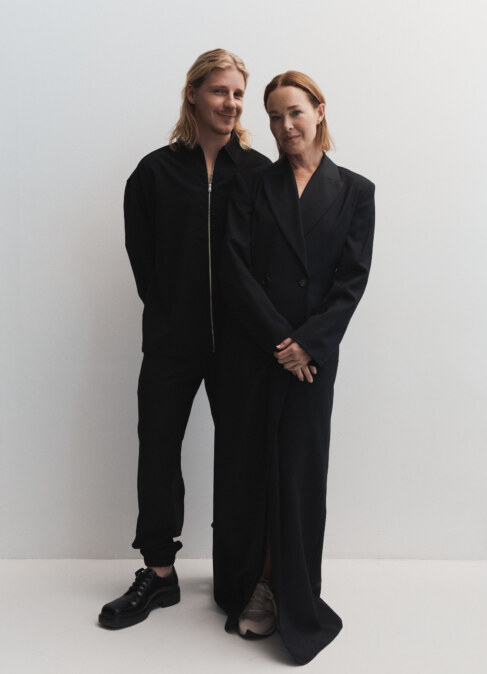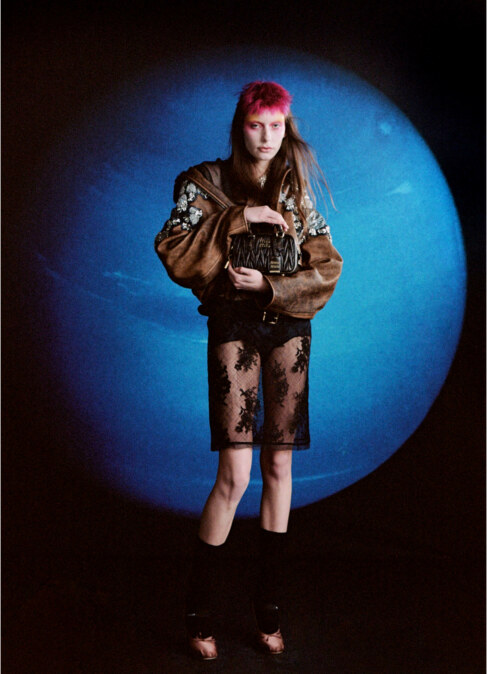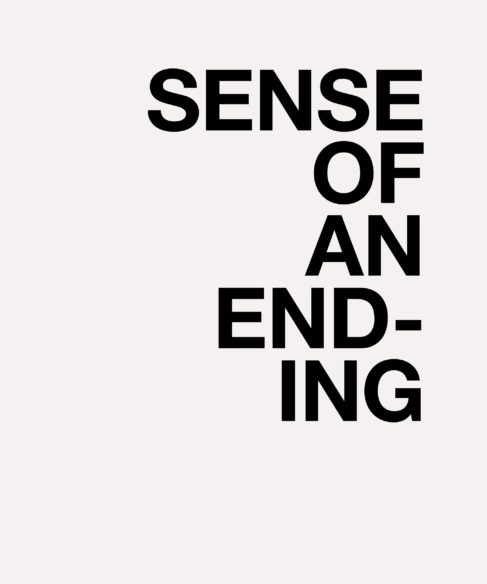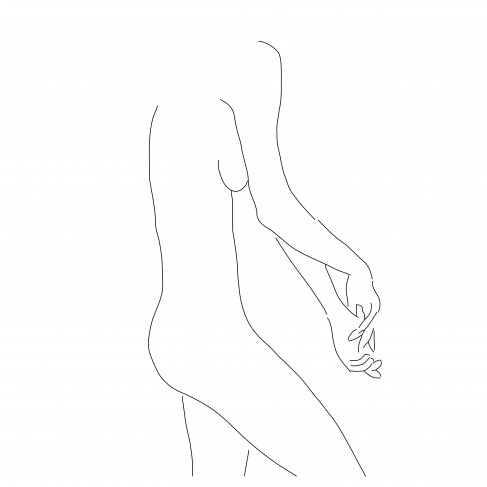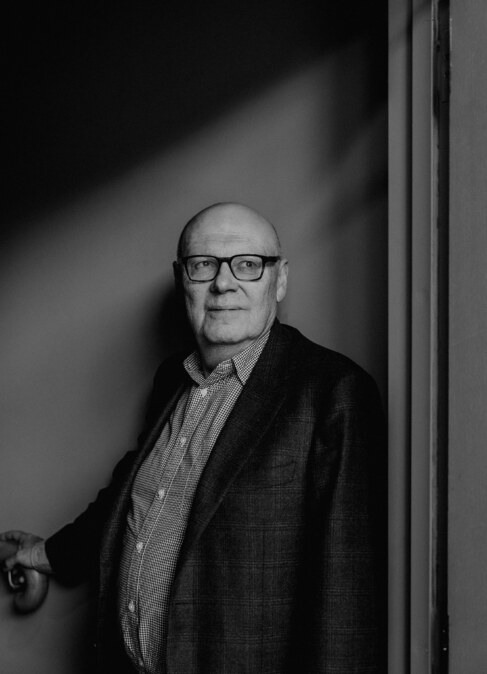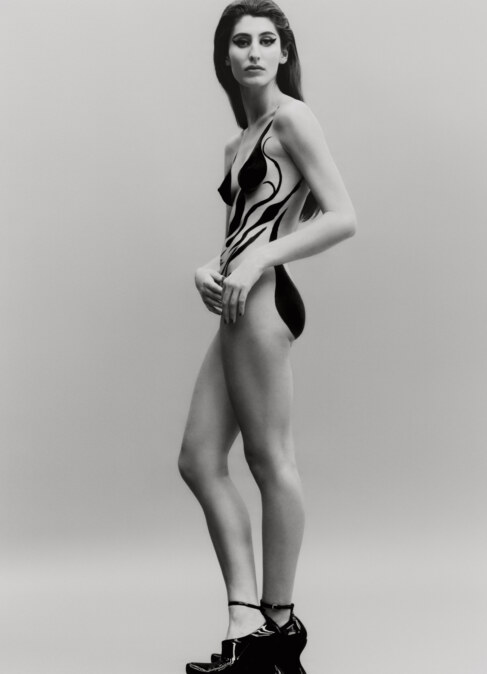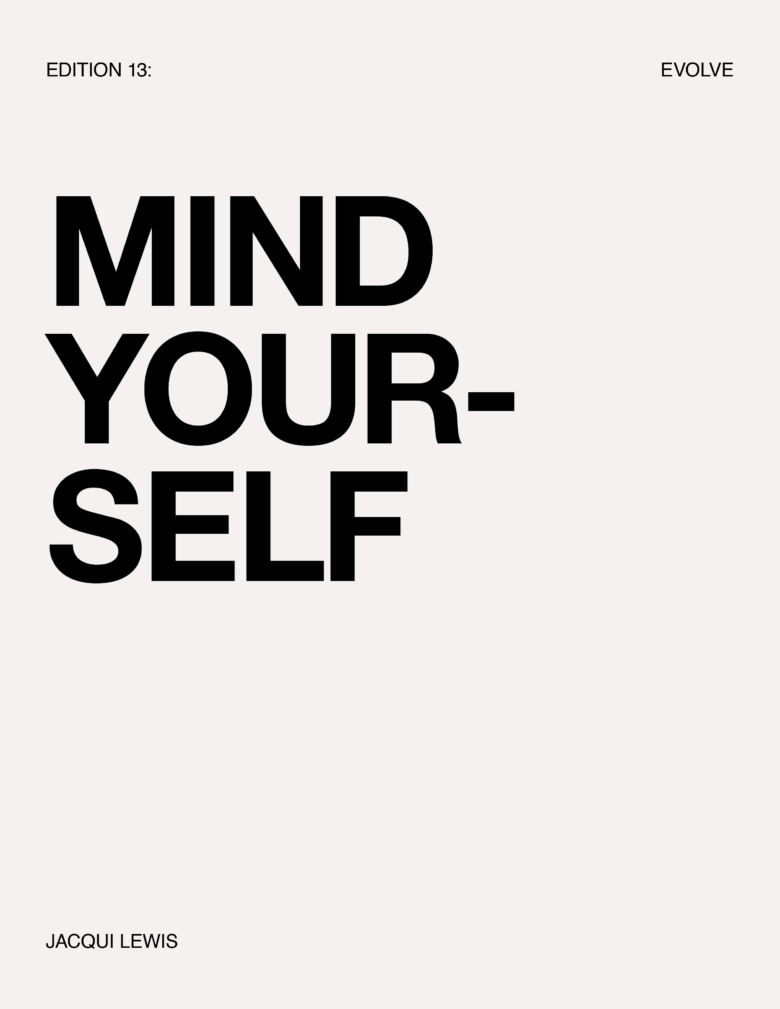
MIND YOURSELF BY JACQUI LEWIS
WRITTEN BY: Jacqui Lewis
To evolve is to be moving, shifting, transforming, and changing.
It is the only element that remains a constant for us all, at each moment in our lives; as humans, we know that change is inevitable. Yet, often we get stuck, becoming stagnant, repeating patterns and behaviours that don’t serve us, living with little creativity and grace. We seem to evolve as though we are being dragged behind a bus, dirty and beat up. However, we must know that we hold the power to actively evolve, engaging with our personal evolution with wonder and awe, learning as we go on a day-to-day basis.
A key aspect of evolution relevant to our modern world and the current digital landscape is the often missed art of being present – and the subsequent need to shift the way we live our busy lives, to find a more sustainable way of being and doing. As Oliver Burkeman so aptly puts it, ‘The world is bursting with wonder, and yet it’s the rare productivity guru who seems to have considered the possibility that the ultimate point of all our frenetic doing might be to experience more of that wonder’. Our conditioning in modern society comes from workaholics addicted to social media, who fail to prioritise their emotional, physical and spiritual health. However, you can individually change this for yourself, increasing your capacity for clarity, creativity and joy.
One of my favourite Zen fables, which I will alter for more colour, reads as so: A very young monk wished to study and reside with a prestigious older monk. The older monk refused him, saying he needed many more years of study before he would take him on, but to keep in touch with letters.. and then one day he might invite him for an interview. Many decades passed with many letters exchanged, before finally, the older monk, now a respected Zen Master, wrote to the younger monk, who was now not so young, to meet with him. The younger monk set out on the three-day pilgrimage to visit the Master at his old temple in the mountains. Arriving on foot, exhausted and drenched from the rain, the front office quietly told the monk that the Zen Master was waiting for him in the dojo down the path. The monk hurried up the path, shook the rain from his coat, removed his clogs, rested his umbrella on the decking, gathered himself with a deep slow breath, and entered. The older monk was sitting silently drinking tea. The younger monk entered, sat with him and was served tea. Unsure what to do in the silence that ensued, the younger monk began to explain all the things he had learned from all the wonderful Zen masters he had studied with. Five years here, six years there, two years with this Master, seven years with another and so on. And he proudly and rather excitedly shared all the knowledge and techniques he had gained. The Master sat listening until the younger monk eventually completed his lengthy monologue. The Master quietly asked, ‘is it raining outside just now?’. The monk paused, confused. ‘Yes’, he replied, ‘it’s been raining all day’. The Master paused and then asked, ‘when you entered earlier, did you place your umbrella to the left or the right of your clogs?’. The now blushing monk, furiously trying to remember, admitted he was unsure. The Master responded, ‘still so much Zen study to be done’.
So, I ask you.. Which side did you place your toothbrush on this morning after brushing your teeth? How did it rest? Where was your awareness as you got out of bed this morning? Where is your attention right now, this very second? Are you completely and wholly engaged in reading, or is your mind darting here and there? Have you got multiple tabs open? Is there music playing, or a TV series?
The message is that if we’re too busy acquiring all the techniques and knowledge, but missing the integration of the wisdom, and are not present to every moment of our lives, we’re totally missing the point. We can’t just absorb, acquire, take more on, without soaking up, inhabiting. Yet this is how most of us live, flitting from one thing to the next, never quite there for it, slightly distracted and then onto the next shiny thing. We have become so beholden to technology, acquiring experiences and then sharing them on the various platforms that we are missing out on being deeply present in our lives. Do not miss the point of your wonderful life. You’re meant to be here, now, in this very moment, fully.
Quick checkings of how many pickups you do in a day with your phone, or checking the total hours of screen time daily, can be a huge wake-up call. Is that where we want our time to go? What is happening to our awareness, and therefore our lives, if we are constantly looking at the tiny screen, to distract us from our work in the middle-sized screen, only then to come home and look at a bigger screen? I think all of us are aware that we are overly engaged in technology and that it is not doing our brains or mental health any favours. But we must become more disciplined in the art of engagement. Awareness on the individual moments in each day helps with this. Awareness of how we feel without our phones in every moment and having tech-free times so that we can learn to engage in better ways, all helps with this process.
As modern humans, we pride ourselves on how busy we are. Not engaged, not creative, not kind, but ‘busy’. It’s the core focus of most businesses and their employees. There is a deep need to reframe (with awareness) this sense of ‘busyness’. I work with students on understanding the philosophy, Three Speeds – an ideology that offers three different speeds of being, all integral and powerful in their own right – to navigate just how we might best engage with our work lives. This philosophy spills seamlessly into our personal lives, too – so take from this what works.
The first speed: Deep Relaxation. This approach is about disconnecting ourselves from our work, to nourish and give our brains and minds a deep rest. The second, Deep Create, is not creating per se, but planning, with discernment and diligence. It’s taking the time to review, plan, and not get caught in constant activity and outcomes, but plan in a creative, lateral and confident way. Then comes Deep Hustle! This is the speed at which we can really go for it. We are rested, we have a clear plan, and we get right into it. It’s a more fire-like burn, energetic and productive.
The problem in the modern world is that Deep Hustle has become our constant single speed: burn out, anxiety, frenetic minds and bodies. And then on the other end of the spectrum, excessive spirituality and self-development is encouraging ONLY deep rest and relaxation. Acknowledging we are multi-dimensional beings that need different moments for different levels of energy and input is vital. We need to refuel, we need to review and plan, and we need to execute. They can’t all be done simultaneously with any level of grace.
I urge you to consider the month ahead. Where in your life could you embrace this concept of Three Speeds? At what speed are you currently dominant? How can you be more lateral, more nourishing, encourage moments of deep rest, and then fully show up when you need to do your deeper work? How do you think you might feel if you embraced this each week? How might you choose to work with your awareness to be more present in every facet of each day. Be present and open to all facets; present to relaxation, finely tuned to planning, and acutely aware of when you’re in a deep productivity mode. Watch your life begin to shift into gaining more energy, more clarity and more happiness as you proceed.
___
SIDE-NOTE acknowledges the Eora people as the traditional custodians of the land on which this project was produced. We pay our respects to Elders past and present. We extend that respect to Aboriginal and Torres Strait Islander peoples reading this.

